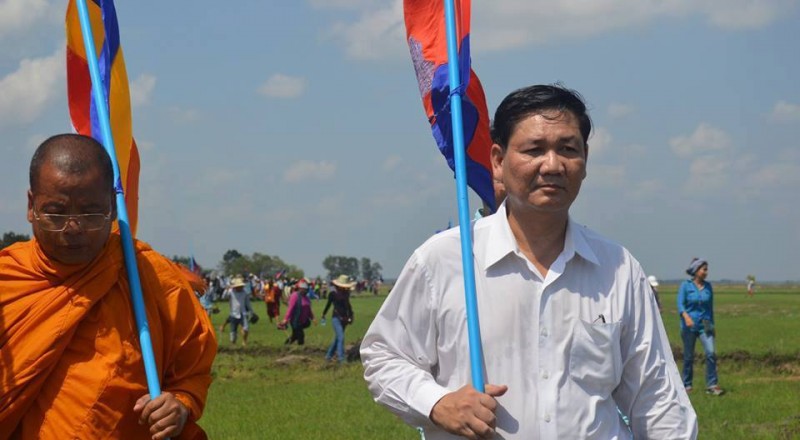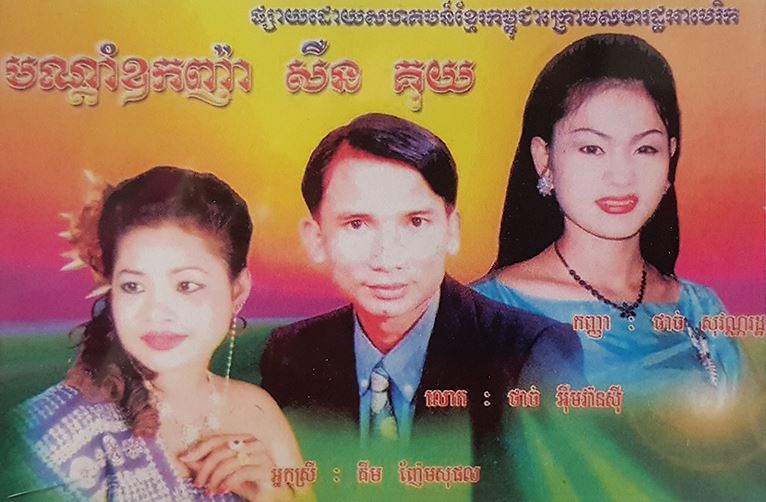អ្នករាយការណ៍ អ.ស.ប. រិះគន់កម្ពុជាថា បានរំលោភលើសិទ្ធិមនុស្ស
Government taken to task at UN meet
Thu 8th Waxing Moon of Assayuja B.E.2561, September 28, A.D.2017 Year of the Rooster

UN Special Rapporteur Rhona Smith (right) speaks to the press in Phnom Penh last month. Photo supplied
ភ្នំពេញ ប៉ុស្តិ៍
ភ្នំពេញៈ កាលពីម្សិលមិញអ្នករាយការណ៍ពិសេស អង្គការសហប្រជាជាតិប្រចាំកម្ពុជាបានរិះគន់រដ្ឋាភិបាលកម្ពុជា ចំពោះការរំលោភសិទ្ធិមនុស្ស និងការបង្កឲ្យមានមន្ទិលសង្ស័យ ថាតើការបោះឆ្នោតនៅឆ្នាំក្រោយនឹងប្រព្រឹត្តទៅដោយសេរី និងយុត្តិធម៌ដែរឬយ៉ាងណា?
ក្នុងអំឡុងកិច្ចប្រជុំក្រុមប្រឹក្សាសិទ្ធិមនុស្សលើកទី ៣៦ អ្នករាយការណ៍ពិសេសរបស់អង្គការសហប្រជាជាតិលោកស្រី Rhona Smith បានថ្លែងថាសង្គមស៊ីវិល និងគណបក្សប្រឆាំងបានប្រឈមនឹងការគំរាមកំហែងយ៉ាងធ្ងន់ធ្ងរ។
លោកស្រីមានប្រសាសន៍ថា៖ «ការរឹតបន្តឹងលទ្ធិប្រជាធិបតេយ្យ និងការធ្វើឱ្យខូចដល់ស្ថាប័នប្រជាធិបតេយ្យបានឈានដល់កម្រិតមួយដែលមិនធ្លាប់មានពីមុនមកនៅក្នុងប្រវត្តិសាស្ត្រកម្ពុជាក្រោយឆ្នាំ ១៩៩៣។ ប្រទេសនេះហាក់ដូចជាកំពុងផ្លាស់ប្តូរយ៉ាងខ្លាំងក្លាឆ្ពោះទៅរកភាពអន្តរាយមួយ»។
លោកស្រីបានលើកឡើងថាការចាប់ខ្លួនមេដឹកនាំគណបក្សប្រឆាំងលោក កឹម សុខា គឺខុសច្បាប់ដោយសារតែអភ័យឯកសិទ្ធិសភារបស់គាត់ ហើយលោកស្រីបញ្ជាក់ថាការចោទប្រកាន់ពីបទល្មើសជាក់ស្តែងគឺមិនមានភ័ស្តុតាង ខណៈដែលការចោទប្រកាន់នោះគឺផ្អែកលើសុន្ទរកថារបស់លោកដែលបានកត់ត្រាកាលពីឆ្នាំ ២០១៣។
លោកស្រី Smith ក៏បានកត់សម្គាល់ថានេះគឺជាលើកទីបួនហើយក្នុងរយៈពេលពីរឆ្នាំដែលយុទ្ធសាស្ត្រនេះត្រូវបានគេប្រើប្រាស់ដើម្បីចាប់ខ្លួនតំណាងរាស្ត្រ។
លោកស្រី Smith ថ្លែងថា ការធ្វើវិសោធនកម្មច្បាប់ថ្មីស្តីពីគណបក្សនយោបាយនាពេលថ្មីៗនេះបានធ្វើឲ្យប៉ះពាល់យ៉ាងធ្ងន់ធ្ងរដល់លទ្ធិប្រជាធិបតេយ្យ។
លោកស្រីបន្តថា៖ «តាមពិតទៅជោគវាសនារបស់គណបក្សនយោបាយប្រឆាំងហាក់ដូចនៅក្នុងកណ្តាប់ដៃរបស់នីតិប្រតិបត្តិ»។ លោកស្រីបានថ្លែងថា មិនត្រឹមតែគណបក្សប្រឆាំងប៉ុណ្ណោះទេ ដែលស្ថិតនៅក្រោមការគំរាមកំហែងនោះ។
លោកស្រីបានបញ្ជាក់ថាច្បាប់ស្តីពីសមាគម និងអង្គការមិនមែនរដ្ឋាភិបាលឆ្នាំ ២០១៥ បានដាក់កម្រិតមិនសមហេតុផលទៅលើអង្គការសង្គមស៊ីវិលដោយតម្រូវឱ្យអង្គការក្រៅរដ្ឋាភិបាលត្រូវមានភាពអព្យាក្រឹតខាងនយោបាយ។
លោកស្រីបញ្ជាក់ថា៖ «នៅក្នុងប្រទេសកម្ពុជាអ្វីៗស្ទើរតែទាំងអស់អាចនឹងត្រូវបានគេចោទប្រកាន់ថាជារឿងនយោបាយ។ ការអំពាវនាវឱ្យគោរពសិទ្ធិមនុស្ស និងលទ្ធិប្រជាធិបតេយ្យត្រូវបានគេចាត់ទុកថា ជាឧបាយកលនយោបាយ និងការវាយប្រហារដោយលំអៀងដើម្បីប្រឆាំងនឹងរដ្ឋាភិបាល»។
លោកស្រីលើកឡើងថារួមជាមួយ «ការកាត់បន្ថយយ៉ាងខ្លាំងនូវសេរីភាពរបស់ប្រព័ន្ធផ្សព្វផ្សាយ» (ការបិទទ្វាររបស់កាសែត Cambodia Daily និងស្ថានីយវិទ្យុផ្សេងៗ) ដែលចំណុចនេះមានន័យថាភាពយុត្តិធម៌នៃការបោះឆ្នោតនៅឆ្នាំក្រោយអាចនឹងជាប់គាំង។
លើសពីនេះលោកស្រីថ្លែងថា៖ «វោហារស័ព្ទពីអំពើហិង្សារបស់រដ្ឋមន្ត្រីរដ្ឋាភិបាល និងមន្ត្រីយោធាជាន់ខ្ពស់គឺបានបង្កើតឱ្យមានការភ័យខ្លាច និងក្លាយជាឧបសគ្គដល់ការបោះឆ្នោតដោយសេរី។ ការប្រើអំណាច ការគំរាមកំហែង និងការបំភិតបំភ័យគឺគ្មាននៅក្នុងសង្គមដែលមានសន្តិភាពទេ»។
នៅពេលទាក់ទងតាមទូរស័ព្ទកាលពីម្សិលមិញ អ្នកនាំពាក្យទីស្តីការគណៈរដ្ឋមន្ត្រីលោក ផៃ ស៊ីផាន បានច្រានចោលចំពោះសេចក្តីថ្លែងរបស់លោកស្រី Smith ដោយលោកថ្លែងថា៖ «គាត់មិនយុត្តិធម៌ទេ។ គាត់ពិតជាលម្អៀងខ្លាំងណាស់។ គាត់មិនមែនជានរណាម្នាក់នៅក្នុងប្រទេសកម្ពុជាទេ… គាត់គឺជាភ្ញៀវទេសចរម្នាក់»។
លោក ស៊ីផាន បានស្នើឱ្យលោកស្រីត្រូវ «ចំណាយពេលវេលាសិក្សាស្វែងយល់អំពីច្បាប់របស់កម្ពុជាបន្ថែមទៀត»។
លោកបានបន្ថែមថា៖ «យើងមិនមែនជាស្វាទេ។ យើងមិនត្រូវការគ្រូបង្រៀនដូចគាត់ [ប្រាប់យើង] ឱ្យធ្វើរឿងនេះធ្វើរឿងនោះទេ … គាត់គិតថាយើងគឺជាសត្វ»។
ឯកអគ្គរាជទូតកម្ពុជាប្រចាំអង្គការសហប្រជាជាតិលោក ណី សំអុល ក្នុងសម័យប្រជុំនោះបានលើកឡើងអំពីការរិះគន់ដោយអយុត្តិធម៌។
លោកបានហៅរបាយការណ៍របស់លោកស្រី Smith ថាលម្អៀងដែលមិនត្រឹមតែធ្វើឲ្យប៉ះពាល់ដល់ការប្តេជ្ញាចិត្តរបស់រដ្ឋាភិបាលចំពោះការរីកចម្រើនប៉ុណ្ណោះទេ ប៉ុន្តែវាក៏បង្កឱ្យមានហានិភ័យយ៉ាងធ្ងន់ធ្ងរដល់ភាពជឿជាក់នៃប្រព័ន្ធសិទ្ធិមនុស្សរបស់អង្គការសហប្រជាជាតិទាំងមូលផងដែរ។
លោក សំអុល បានគូសបញ្ជាក់អំពីកំណើនសេដ្ឋកិច្ចដ៏មានស្ថិរភាពនៅក្នុងប្រទេសហើយលោកបានទទូចថាលោកស្រី Smith បានមើលឃើញតែចំណុចមិនល្អហើយថ្លែងថាលោកស្រីពឹងផ្អែកតែទៅលើ «ប្រភពដែលមិនត្រូវបានផ្ទៀងផ្ទាត់ប៉ុណ្ណោះ»។
ប៉ុន្តែយោបល់របស់លោកស្រី Smith ត្រូវបានគាំទ្រយ៉ាងទូលំទូលាយពីសហភាពអឺរ៉ុប និងប្រទេសជាច្រើនរួមនឹងអង្គការមិនមែនរដ្ឋាភិបាលដែលចូលរួមក្នុងកិច្ចប្រជុំនោះផងដែរ។
ជាឧទាហរណ៍តំណាងមកពីសហភាពអឺរ៉ុបបានហៅការចោទប្រកាន់ទៅលើសកម្មជនសិទិ្ធមនុស្ស និងអ្នកតំណាងរាស្ត្រគណបក្សប្រឆាំងរួមទាំងលោក កឹម សុខា ផងដែរថាជារឿងនយោបាយ ហើយលោកបានថ្លែងបញ្ជាក់ថា អភ័យឯកសិទ្ធិសភារបស់លោក កឹម សុខា ត្រូវបានគេរំលោភបំពាន។
អង្គការពិភពលោក (World Organisation) ដែលប្រឆាំងទៅនឹងការធ្វើទារុណកម្មក៏បានចង្អុលបង្ហាញពីការចាប់ឃុំឃាំងបុគ្គលិកអង្គការមាតាធម្មជាតិកាលពីពេលថ្មីៗនេះផងដែរគឺលោក ហ៊ុន វណ្ណៈ និងលោក ឌឹម គុណឌី និងបានហៅស្ថានភាពនេះថាជាការវាយប្រហារយ៉ាងខ្លាំងក្លាប្រឆាំងនឹងសង្គមស៊ីវិល។
អ្នកតំណាងរូបនេះបានថ្លែងថា៖ «អ្នកជំនាញផ្នែកច្បាប់មកពីសហគមន៍អន្តរជាតិបានថ្កោលទោសយ៉ាងខ្លាំងក្លា ចំពោះកង្វះឯករាជភាព និងភាពលម្អៀងនៃប្រព័ន្ធយុត្តិធម៌។ អ្វីដែលកំពុងកើតឡើងនៅក្នុងប្រទេសកម្ពុជានាពេលបច្ចុប្បន្ននេះគឺគ្មានអ្វីទាក់ទងទៅនឹងនីតិរដ្ឋនោះទេ»៕ NS
Government taken to task at UN meet
Thu, 28 September 2017
The Phnom Penh Post
The UN’s special rapporteur on Cambodia yesterday slammed the Kingdom’s government at the 36th session of the UN Human Rights Council, going so far as to express doubt as to whether next year’s crucial elections will be free and fair.
During the session, Special Rapporteur Rhona Smith said that civil society and the opposition faced severe threats.
“Restrictions of the democratic space and undermining of democratic institutions have reached an unprecedented level in Cambodia’s post-1993 history,” she said. “The country seems to be moving inexorably towards a precipice.”
She argued that opposition leader Kem Sokha’s arrest – on widely criticised charges of “treason” – was illegal due to his parliamentary immunity, and that bypassing his immunity on the grounds that it was an in flagrante delicto offence was unfounded. The constitution allows for the arrest of lawmakers if they are caught in flagrante delicto – or “red-handed” – but Sokha’s charges stem from a speech recorded in 2013.
Even in such cases, the constitution calls for a two-thirds vote to lift a member’s immunity. Though the ruling Cambodian People’s Party holds just over half of the body’s seats, it nonetheless maintained it could allow Sokha’s prosecution to proceed. Smith noted that this was the fourth time in two years this strategy had been used to arrest opposition lawmakers.
Smith said recent controversial amendments to the Law on Political Parties – which targeted the opposition and broadened the grounds for the dissolution of parties – had severely impacted democracy. “In practice, the fate of the political opposition appears to be in the hands of the executive,” she said.
But it was not only the opposition under threat, she said. The 2015 Law on Associations and NGOs, she said, imposed unreasonable restrictions on civil society through vaguely defined stipulations that NGOs be politically “neutral”.
“In contemporary Cambodia, almost anything can be alleged political. Calls for respect for human rights and democracy are now branded as political manipulation and biased attacks against the government,” she said.
This, in conjunction with a “dramatic reduction in freedom of the media” – with numerous independent outlets recently shuttered – meant the fairness of elections next year was at stake, she added.
“The regular violent rhetoric of government ministers and senior military officers creates fear, a barrier to free elections,” she said, referring to frequent veiled threats against the opposition and vows to crush so-called “colour revolutions”.
“With power comes responsibility and regular threats and scaremongering has no place in a peaceful society.”
However, Phay Siphan, a government spokesman, yesterday rejected the rapporteur’s assessment. “She’s not fair. She’s very biased,” he said.
“She is nobody in Cambodia . . . She’s a tourist,” he continued, asking Smith to “spend more time reading” Cambodian law.
“We’re not monkeys. We don’t need a teacher like her to [tell us] to do this or that,” he added.
Cambodian Ambassador to the UN Ney Samol echoed the sentiment at the session. He accused Smith of “cherry-picking”, arguing her report not only undermined his government’s determination for progress, but also posed “serious risk to the credibility of the entire United Nations human rights system”.
But Smith’s comments were widely endorsed by the EU, numerous countries and NGOs participating in the session.
The EU representative called charges against activists and opposition members, including Sokha, “politically motivated”, and seconded Smith’s assertion that Sokha’s immunity had been breached.
The World Organisation against Torture pointed to the recent “arbitrary detention” of environmental activists, and called the situation a “rapidly deteriorating attack against civil society”.
The International Community of Jurists, meanwhile, condemned the lack of independence in the judiciary. “What is happening in Cambodia today has nothing to do with the rule of law.”
Related
សូមគាំទ្រឧបត្ថម្ភ សហគមន៍ខ្មែរក្រោម Support KKC
សូមអរគុណដ៏ជ្រាលជ្រៅចំពោះសប្បុរសជននូវវិភាគទានទាំងនេះ។
We’re On Facebook

Sign in
Click here to reload the page over ssl.




